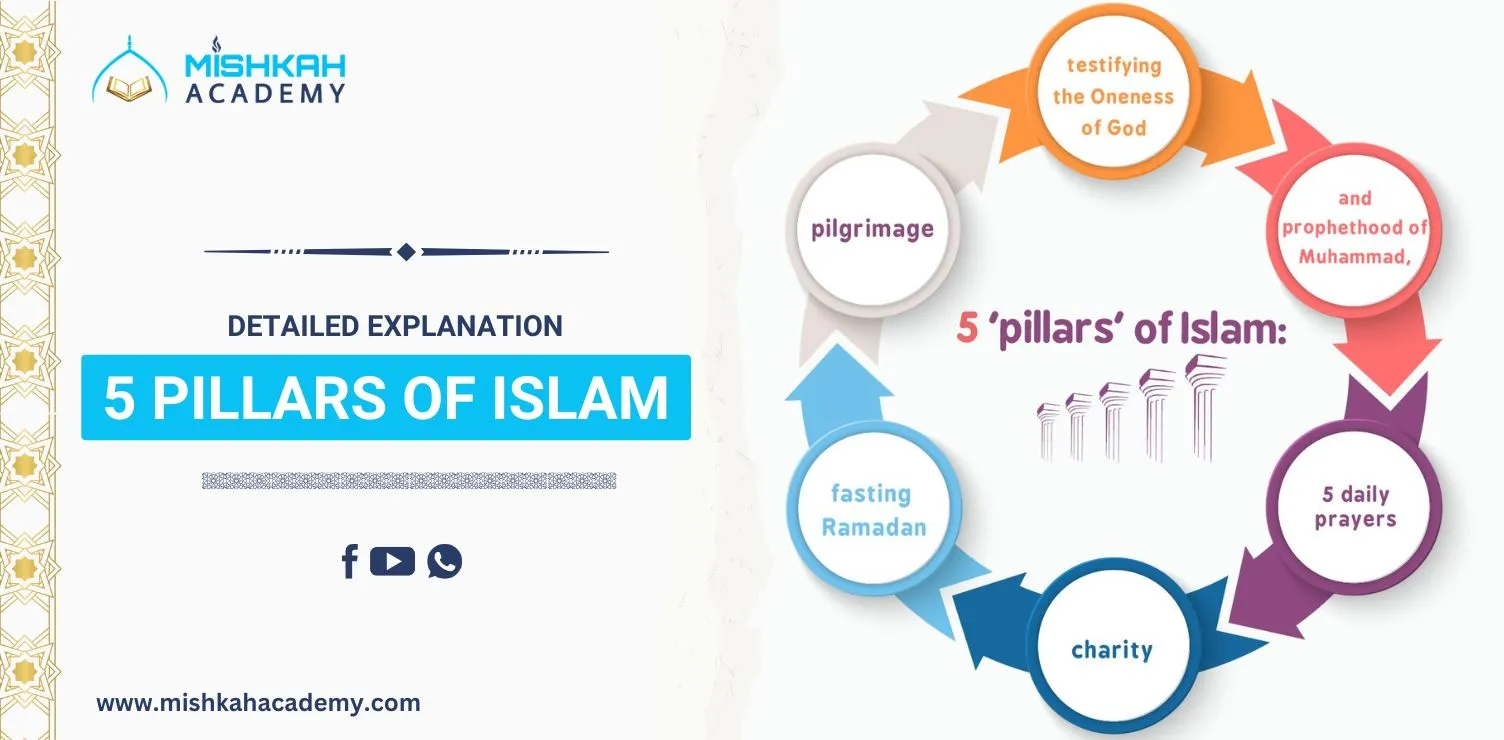The pillars of Islam are the foundation, guiding every Muslim’s beliefs and actions. They represent essential practices that define a Muslim’s faith and commitment. These five pillars include Shahada (faith declaration), Salat (daily prayers), Zakat (charity), Sawm (fasting during Ramadan), and Hajj (pilgrimage to Mecca). Each pillar holds deep meaning and is crucial for fulfilling one’s religious duty.
This article explains each pillar of Islam in detail, helping you understand their importance and how they shape a Muslim’s life. With straightforward explanations, we’ll cover what each pillar means, its practices, and why it matters in everyday life.
What Are the Five Pillars of Islam?
Table of Contents
ToggleThe five pillars of Islam are the fundamental beliefs and practices of Muslims, and they are regarded duties for all true followers of the Prophet Muhammad (PBUH).
| Pillar | Description |
| Shahada | Declaration of faith in the oneness of Allah. |
| Salat | Performing five daily prayers at set times. |
| Zakat | Giving a portion of wealth to support the needy. |
| Sawm | Fasting during Ramadan to develop self-discipline. |
| Hajj | Pilgrimage to Mecca for spiritual renewal. |
5 Pillars of Islam in Detail Guide
1. Shahada
Part One: Belief in Allah’s Oneness
The Shahada begins with the phrase “La ilaha illallah” (There is no god but Allah), affirming that only Allah is worthy of worship. This is the foundation of monotheism in Islam. In Surah Al-Ikhlas, Allah emphasizes His uniqueness, saying, “Say, ‘He is Allah, [Who is] One. Allah, the Eternal Refuge. He neither begets nor is born, nor is there to Him any equivalent” (Surah Al-Ikhlas, 112:1-4). This verse highlights Allah’s uniqueness and how nothing can compare to Him. A Hadith from Sahih Bukhari also reinforces this, stating that “Whoever says ‘La ilaha illallah’ will enter Paradise” (Sahih Bukhari), emphasizing that true faith in Allah’s oneness grants salvation.
Part Two: Belief in Prophet Muhammad (PBUH)
The second part of Shahada, “Muhammadur Rasulullah” (Muhammad is the Messenger of Allah), signifies recognizing Prophet Muhammad (PBUH) as the final prophet, through whom Allah’s last message was revealed. The Quran mentions, “Muhammad is not the father of any of your men, but [he is] the Messenger of Allah and the seal of the prophets” (Surah Al-Ahzab, 33:40), which confirms the finality of his prophethood. Prophet Muhammad (PBUH) also said, “I am the last of the Prophets; there will be no prophet after me” (Sahih Muslim). This shows the necessity of following the Prophet’s teachings as a complete guide to Islam.
2. Salah
Salah, or the five daily prayers, are obligatory acts that structure a Muslim’s day around the remembrance of Allah.
- Fajr: Prayer at dawn, symbolizing the start of a new day.
- Dhuhr: Midday prayer, often marking a break from work to connect with Allah.
- Asr: Afternoon prayer, reminding Muslims of faith during daily activities.
- Maghrib: Sunset prayer, symbolizing gratitude as the day ends.
- Isha: Night prayer, offering peace before resting.
The Quran commands, “Indeed, prayer has been decreed upon the believers a decree of specified times” (Surah An-Nisa, 4:103), establishing that each prayer time is crucial for connecting with Allah.
Praying consistently also reminds Muslims to stay humble and grateful, keeping spiritual health as a priority. The Prophet (PBUH) said, “The first thing a person will be questioned about on the Day of Judgment is his prayer” (Sunan Abu Dawood), emphasizing that prayer is a core duty and a reflection of one’s faith.
Each prayer has specific physical movements and words, promoting discipline, humility, and unity among Muslims. The bowing and prostrating during prayer signify total submission to Allah.
Note: By enrolling in “Online Islmaic Course” with certified Islamic scholars to learn and understand core pillars of Islam properly.
Start Your Islam Learning Journey Now
3. Zakat
Zakat, or charity, purifies wealth by sharing a portion with the less fortunate. This act fosters a sense of social responsibility, reminding Muslims of their duty to support their community.
Conditions for Zakat
- Must pay 2.5% of total wealth annually if savings exceed nisab (85 grams of gold or equivalent).
- Applies only to Muslims with a stable income and savings for a full lunar year.
- Eligible recipients include the poor, needy, those in debt, and other groups specified in the Quran.
The Quran states, “Take, [O, Muhammad], from their wealth a charity by which you purify them” (Surah At-Tawbah, 9:103), illustrating how Zakat cleanses one’s heart from greed and strengthens empathy. This pillar is obligatory for those who meet certain financial criteria, making it a structured way to help those in need.
Prophet Muhammad (PBUH) described the importance of giving, saying,
“Charity does not decrease wealth” (Sahih Muslim).
This hadith implies that giving in charity brings blessings, often resulting in spiritual and even material gains. Zakat encourages Muslims to detach from excessive materialism, reminding them of their responsibility to aid others.
4. Fasting
Fasting during Ramadan requires abstinence from food, drink, and immoral acts from dawn to sunset, intending to attain taqwa (God-consciousness).
Conditions for Fasting
- Fasting is obligatory for all adult Muslims in good health.
- Exemptions include the elderly, travelers, pregnant women, and those who are ill.
The Quran states,
“O you who have believed, decreed upon you is fasting as it was decreed upon those before you that you may become righteous” (Surah Al-Baqarah, 2:183).
This verse emphasizes fasting’s purpose: to cultivate self-discipline and spiritual growth. Fasting fosters empathy by allowing Muslims to experience hunger and thus better understand the struggles of the poor.
Prophet Muhammad (PBUH) highlighted the significance of fasting in Ramadan: “Whoever fasts during Ramadan out of faith and in the hope of reward, all his previous sins will be forgiven” (Sahih Bukhari). This hadith illustrates the spiritual cleansing that fasting provides, showing it as a time for sincere repentance. Besides abstaining from physical needs, fasting includes avoiding gossip, anger, and immoral actions
5. Hajj
Hajj, the pilgrimage to Mecca, is a unique journey of faith, symbolizing unity and humility.
Conditions for Hajj
- Must perform Hajj at least once in a lifetime if physically and financially capable.
- Includes specific rites, such as Tawaf (circling the Kaaba) and standing at Arafat.
The Quran emphasizes its importance:
“And complete the Hajj and ‘Umrah for Allah” (Surah Al-Baqarah, 2:196).
Every year, Muslims from around the world gather in Mecca, dressed in simple white garments, which strip away societal distinctions, emphasizing equality before Allah.
Prophet Muhammad (PBUH) stated,
“Whoever performs Hajj and does not commit any obscenity nor wrongdoing will return as free from sin as the day his mother gave birth to him” (Sahih Bukhari).
This hadith highlights Hajj’s role in spiritual renewal and forgiveness. The pilgrimage includes symbolic acts such as Tawaf, which reminds Muslims of their life’s purpose centered around Allah, and the standing at Arafat, a time for intense prayer and reflection.
Facts About Five Pillars of Islam
Here’s a table summarizing some factual details about each of the Five Pillars of Islam:
| Pillar | Key Facts |
| Shahada |
|
| Salah |
|
| Zakat |
|
| Sawm |
|
| Hajj |
|
Final Words
The Five Pillars of Islam form the essential framework guiding a Muslim’s beliefs and actions, creating a life focused on faith, devotion, and compassion. Practicing these pillars strengthens the connection to Allah (SWT) and fosters a harmonious community.
Mishkah Academy is a leader in supporting Muslims on this journey, offering experienced tutors who have taught the principles of Islam for years especially to children in Islamic Clsses for kids. Their skilled guidance ensures a deep understanding of each pillar and its significance.
Start Your Islam Learning Journey Now






